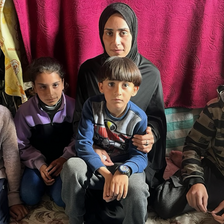The Electronic Intifada 4 December 2024

Fear is all-pervasive in Gaza. (Hadi Daoud / APA Images)
In early October, my family and I were living west of Gaza City. Many Israeli troops had gathered nearby and we were gripped with fear.
My father continuously worried then that these troops would suddenly deploy toward our area and commit massacres.
On 6 October, my father, working as a journalist, decided to go north, heading toward our cousins’ house near Kamal Adwan Hospital. He was going to check out the situation there.
His fleeing to a less perilous area eased the fears of his family members slightly.
But just as we finished packing our belongings to eventually join him, my father called to tell us we could no longer move north as Israel had launched a military operation near where he was.
Our fear, mixed with intense concern for my cousin and aunt in the north, began haunting us again.
My father called my cousin’s husband, urging him to evacuate immediately and come to our house.
“We can’t move,” my cousin’s husband replied, “the Israeli troops are completely surrounding us.”
For several days, we lost contact with my cousin’s family as Israeli troops encircled their area.
We saw on the news that many people were killed there, which intensified our fear.
We tried calling my cousin again every day for a week, but all our attempts failed.
Communication remained sparse, and fear consumed us as we awaited any word on the safety of my cousin and his family.
Cousin’s perilous plight
On 18 October, we finally reached my cousin. She and her family lived only about 325 yards from Kamal Adwan Hospital and had been under siege for seven days.
They tried to evacuate, but they said Israeli military drones targeted anyone who moved or even looked out the windows.
“We stayed without food or a single drop of water for seven days,” my cousin said then.
She and the others there expected death at any moment due to the constant shelling and random bombing of houses over people’s heads.
The Israeli occupation forces ordered them to evacuate, directing the men to go to Kuwait School and the women to Hamad School, both in Beit Lahiya.
The schools were surrounded by Israeli troops and drones equipped with loudspeakers demanding the people to head for the schools.
They were told there would be water.
“The children were in desperate need of water so they were compelled to obey,” my cousin recounted on 18 October.
But upon entering the school, they found nothing. The school had already been burned the previous day.
Being detained
The soldiers interrogated all the women and forced them to leave the school with the children.
The men were taken to an unknown location.
My brother went looking for my cousin early in the morning of 18 October and was able to find her walking along Salah al-Din Street that afternoon. She was exhausted, covered in dust and sand and feeling terrorized from having seen bodies strewn across the road.
She said then she had no idea where her husband was and still doesn’t all these weeks later.
When Israeli soldiers detained my cousin for interrogation, her young children, all under 10, broke down in tears.
The same soldiers who took my cousin’s husband to an unknown fate filmed themselves offering candies to his children, whom they had brought to tears.
The same soldiers drank water, threw the empty bottles on the ground in front of them, and filmed themselves offering the children water. All in a depraved attempt to humiliate them.
Watching a news clip of the sordid events on Facebook filled me with a heavy mix of anger, sorrow and disbelief.
It was a cruel twist, a staged display meant to manipulate the world.
I felt the deep pain of my cousin’s tears, knowing what her children went through – the fear, the loss and the trauma.
Her 3-year-old daughter cried, begging the soldiers to let her mother go.
After an hour, their mother was released, but the father was detained.
What the world does not see
The world is not going to see all of this. The very real pain and terror these soldiers caused to my cousin and her children will be masked over in a lie, a picture of compassion for the purposes of propaganda.
Every day, my cousin reaches out to those who were captured and then released, desperate for any scrap of information about her husband.
We are in December now. Most of my family and I are back at home near Gaza City.
But no one we know knows where my cousin’s husband is.
Still. After all this time.
My cousin’s husband is a man with a kind heart and an unshakable optimism. He always believed the Israel attacks would end soon.
During the first two months of this genocide, my family and I fled to my cousin’s house in Beit Lahiya.
Clean drinking water was a rarity. My cousin’s husband would risk his life to fetch water for us from Kamal Adwan Hospital daily.
One day he set out to buy sweets for his children; I asked him to buy me my favorite chocolate.
He phoned my cousin and told her that he couldn’t find the chocolate I asked for.
“So I’ll search in another store,” he said. “Don’t worry about me; I’ll be back soon.”
His words, seemingly simple at the time, now resonate with an empty, painful optimism as his fate remains a mystery.
The author of this article has requested anonymity.


